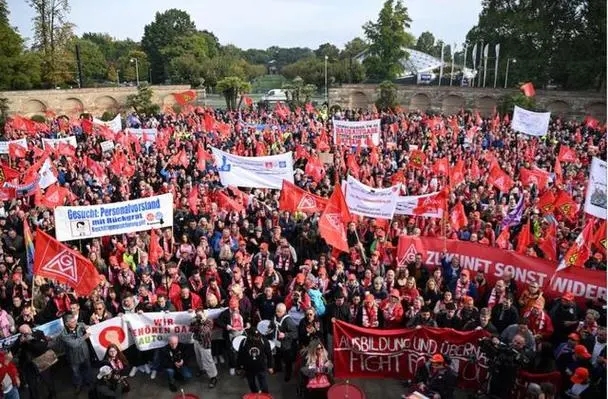
On the stage of the German automobile industry, Volkswagen has always been a pivotal role. However, the recent collapse of talks between Volkswagen and its unions has cast a shadow over the future of the auto giant.
Volkswagen has a long history of conflict with unions, but the breakdown of the talks was triggered by Volkswagen's plans to close factories and cut jobs in Germany due to cost pressures and other factors. This move is unacceptable to the unions because it directly threatens the livelihoods and rights of employees. The union is firmly opposed to the closure of the plant, demanding that the company defend the rights of its employees.
On September 25, the first round of collective bargaining between Volkswagen and the German union IG Metall broke down. After three hours of heated debate, the two sides failed to reach agreement on key issues such as pay rises and job security. Volkswagen has rejected union demands for a 7 percent pay rise and a basic salary of 170 euros for interns and dual-study students. Volkswagen chief negotiator Arne Meswinkel said the company's situation is very serious, and it must safeguard the future viability and competitiveness of Volkswagen in the long term, and reducing costs is a top priority. This means that Volkswagen expects employees to "contribute" during tough times and accept the company's cost-cutting measures.
However, the unions are not buying it. IG Metall's chief negotiator Torsten Grog said after the talks that discussions with management had been "disappointing, even sobering". She noted that Volkswagen "did not flesh out its proposals or outline a concept for the future" in the talks, while the possibility of plant closures and mass layoffs "remains on the table." The union argued that Volkswagen should work with workers to find a solution, rather than unilaterally pushing through a plan of job cuts and wage cuts.
The implications of the breakdown are manifold. For Volkswagen, there may be a risk of labor strikes. The union has threatened to strike from early December if no agreement is reached. Once the strike occurs, Volkswagen's production will be seriously affected, delivery delays, order reduction and other problems will follow, which will deal a huge blow to the company's financial situation and market reputation. In addition, the breakdown of talks could also affect Volkswagen's transformation plans. In the context of the increasingly competitive electric vehicle market, Volkswagen needs to invest a lot of money and manpower in research and development and production, but internal instability will hinder the pace of its transformation.
For the German auto industry and the German economy as a whole, the collapse of the talks between Volkswagen and the unions is also a heavy blow. The automotive sector accounts for more than 7% of the EU's gross domestic product and creates more than 13 million jobs. As the leading enterprise of German automobile industry, the development of Volkswagen is directly related to the rise and fall of German automobile industry. If Volkswagen gets into trouble due to internal conflicts, it will have a negative impact on economic growth, employment and industrial upgrading in Germany. At the same time, it may also trigger a chain reaction for other companies, making the plight of German manufacturing further aggravated.
From a broader perspective, the breakdown of talks between Volkswagen and its unions reflects the challenges facing the global auto industry. With the rise of new energy vehicles, intensifying market competition and rising cost pressure, traditional automakers are in a critical period of transformation. In this process, how to balance the development needs of enterprises and the interests of employees is a problem that every enterprise must face. The Volkswagen case serves as a warning to other companies that sustainable development can only be achieved through adequate communication and consultation with employees to find mutually acceptable solutions.
In the face of the current predicament, both Volkswagen and the union need to think calmly and re-examine each other's positions and demands. The two sides should engage in dialogue with an open mind and seek common interests. The government and all sectors of society should also play an active role in providing support and assistance to the negotiations between the two sides and promoting the settlement of the issue. Only in this way can Volkswagen emerge from its difficulties and continue to play an important role in the global automotive market.

With a loud bang, a nearly 30 meter high giant grain silo in Illinois, USA collapsed, and 816 tons of soybeans broke through the silo walls like a yellow torrent, instantly turning the lawn into a "golden sand dune".
With a loud bang, a nearly 30 meter high giant grain silo i…
Recently, countries such as the United States, Japan, and t…
Recently, Ukraine once again targeted the Novogorsk Petroch…
Recently, according to Reuters, European stock markets have…
In the global market recently, international oil prices and…
On October 22 local time, the US Treasury Department announ…